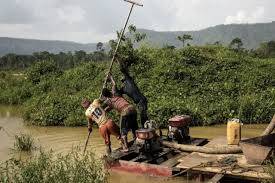Galamsey Devastation: A Threat to Ghana's Land and Water
Illegal mining, commonly known as *galamsey*, continues to wreak havoc on Ghana’s environment, causing severe degradation of forests, contamination of water bodies, and destruction of farmlands. This informal mining practice, often undertaken by individuals or groups without proper permits, has become one of the nation’s most pressing environmental crises.
A recent three-day protest in Ghana served as a stark reminder of the urgent need for action. The protestors, consisting of environmental activists, local farmers, and concerned citizens, came together to demand a stronger government stance against galamsey. Their message was clear: the health and well-being of Ghanaians are at risk due to polluted water sources, toxic chemicals in the soil, and the destruction of essential farmlands.
One of the major concerns associated with galamsey is the contamination of water bodies. Miners frequently use toxic substances like mercury and cyanide in their extraction processes, which end up in rivers and streams, poisoning drinking water sources and threatening aquatic life. In communities that rely on these water sources, residents face heightened risks of health issues, including cancer, respiratory ailments, and skin diseases.
Furthermore, the destruction of forests to make way for illegal mining contributes to deforestation, leading to soil erosion, loss of biodiversity, and altered ecosystems. The loss of fertile land disrupts agriculture, a key source of livelihood for many rural communities, and reduces food production, pushing more Ghanaians into poverty.
Despite government initiatives to curb illegal mining, including military operations to shut down mining sites and destroy equipment, galamsey continues to thrive due to factors such as high unemployment, weak enforcement of regulations, and corruption. Many miners see galamsey as a quick path to income, while others are lured by the prospect of gold’s lucrative market.
The protesters urged the government not only to enforce stricter laws but also to create sustainable employment alternatives for those driven into galamsey by poverty. Without viable livelihood options, many people feel forced to continue this harmful practice, placing both their health and Ghana’s natural resources in jeopardy.
To combat this environmental crisis, comprehensive and collaborative action is required. The government, local communities, and environmental organizations must work together to restore Ghana's degraded land, protect its water bodies, and provide alternatives for affected communities. If unchecked, galamsey will continue to erode the foundations of Ghana’s natural wealth, posing a long-term threat to future generations.



No comments yet
Be the first to share your thoughts!